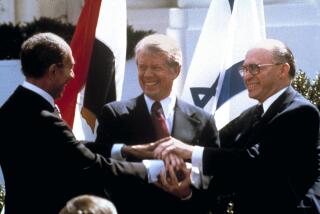Pakistan attempts to salvage peace deal
- Share via
ISLAMABAD, PAKISTAN — Pakistani officials are trying to save a peace deal that was supposed to contain militants near the Afghan border, despite U.S. concern that the pact provided the Taliban and Al Qaeda with an increasingly safe haven.
The top official in the northwestern region said Monday that the collapse of the deal could have dangerous consequences. Pakistani President Pervez Musharraf has long insisted that the 10-month-old accord was key to ending extremism in the tribal region.
Pro-Taliban militants in the lawless North Waziristan region renounced the agreement amid weekend bombings and suicide attacks that killed more than 70 people across the northwest, most of them policemen and soldiers.
Signed in September, the accord was a shift in strategy by Musharraf after the army lost hundreds of soldiers in operations against Al Qaeda hide-outs.
Troops pulled back to barracks or to posts on the border in return for pledges from tribal leaders to expel foreign fighters and halt militant attacks in Pakistan and Afghanistan.
The deal was supposed to open the way for an extensive development program for which the U.S. pledged $750 million over the next five years and which Musharraf said would ultimately dry up support for militancy.
Some U.S. military officers said cross-border attacks surged after the accord took effect, and U.S. counter-terrorism officials warned that the deal allowed Al Qaeda to step up training and planning.
White House Press Secretary Tony Snow called the agreement between tribal leaders and Pakistan a “carrot approach in the tribal areas” that “did not work.”
Akram Khan Durrani, the province’s top elected official, said Monday that a failure of the peace deal would have “dangerous consequences.”
More to Read
Sign up for Essential California
The most important California stories and recommendations in your inbox every morning.
You may occasionally receive promotional content from the Los Angeles Times.













